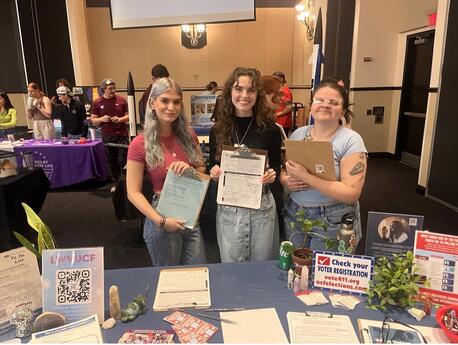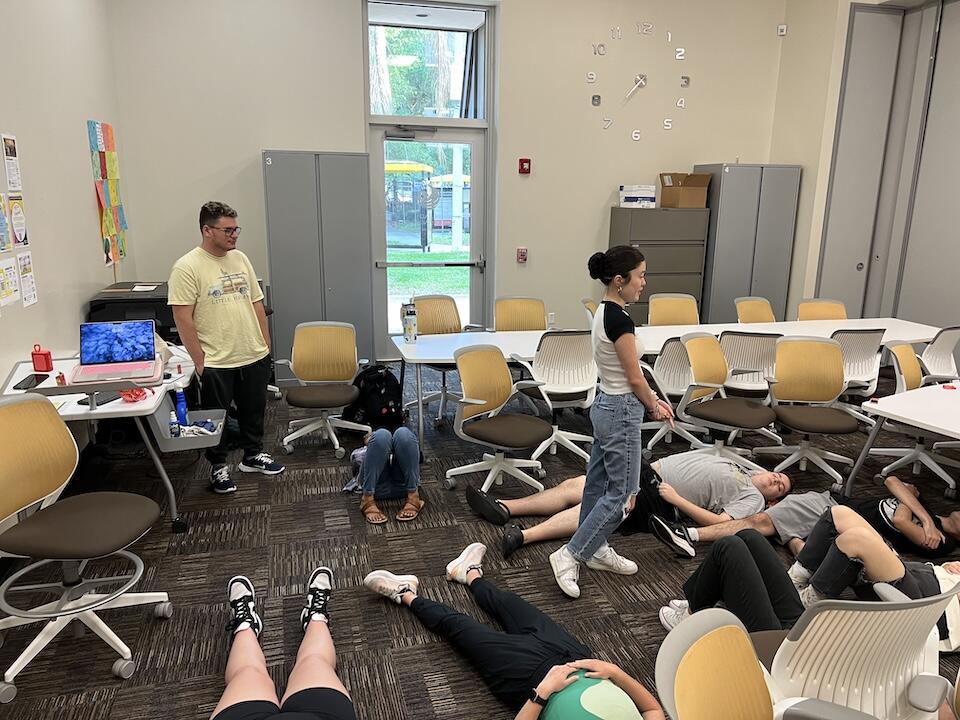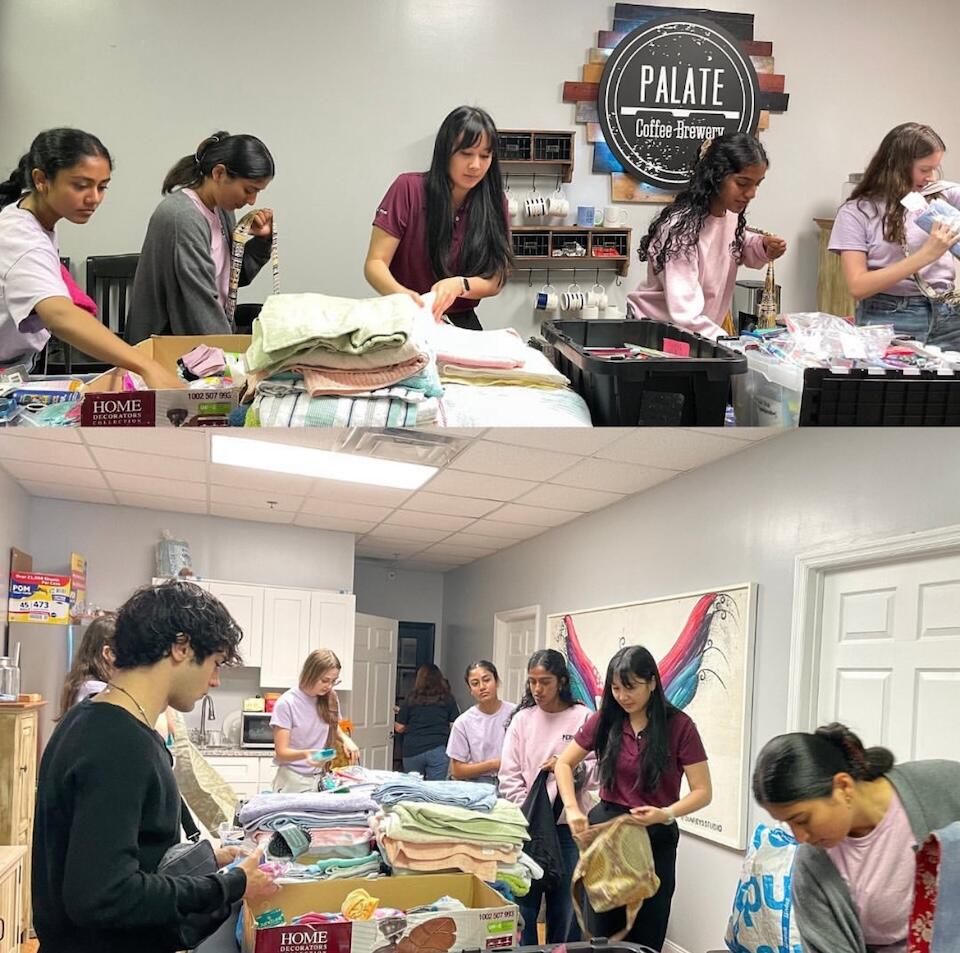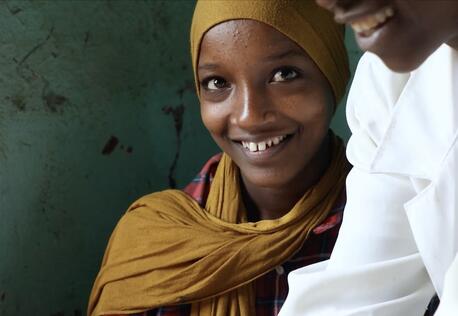
Youth Day, Every Day
Imagine a world where young people are not just the future but also the present heroes of public health. UNICEF USA Community Engagement Intern Maya Puthukkudy highlights some young leaders who are already making an impact in their communities.
Youth around the world have the energy, creativity and innovative thinking required to tackle complex health issues. Highlighting the transformative power of youth by showcasing their leadership shows how they are speaking out and taking action now more than ever to have a profound impact on community health outcomes. As a public health student and health equity advocate myself, I truly believe in the power of youth in shaping our world to be a more united, inclusive and healthier place for all. The contributions of young leaders in my community and globally are not just hopeful aspirations, but real and impactful changes that are happening now.
From leading health campaigns and engaging in peer-to-peer education to addressing health disparities, youth are creating healthier communities for themselves and others. Let’s explore how some young leaders around the world are taking leaps in making a difference in their community.
Young health heroes: leading the charge
Across the globe, youth-led health campaigns are transforming communities and saving lives in more ways than one. These young activists are not only raising awareness about critical health issues but are also implementing innovative solutions and advocating for policies that prioritize the well-being of their peers and community members.
Access to clean water is essential for community health and youth involvement has been crucial in driving initiatives that ensure safe water and improved sanitation for communities. Currently, 74 percent of the world's population has access to safely managed drinking water and 54 percent has access to sanitation services. WASH programs aim to improve water, sanitation, and hygiene facilities in schools and communities. Young leaders are helping construct and maintain these facilities and promoting good hygiene among their peers.
Victoria, 21, a Fellow at the Florida Pipeline Project, and Kylie, 21, an Environmental Studies student at the University of Central Florida (UCF), worked with the League of Women Voters at UCF (LWVUCF) as the former and current president, respectively. The League’s main mission is to get students registered to vote, discuss issues that are important to their generation and serve as a resource for students who are looking to get involved in sociopolitical issues.
Last March, LWVUCF organized a Right to Clean Water Rally on campus to raise awareness for Florida's Right to Clean Water Act, which would regulate industries that take from local water sources and leave them polluted. “It is important for us to lead health initiatives because we are the generation that’s affected the most by pollution, plastic consumption, unclean water and so much more,” Victoria says. While the rally received many signatures, statewide they were not able to reach enough signatures for the 2024 ballot. However, the organization is working towards getting the amendment on the 2026 ballot.
Kylie says, “In recent years, more and more young people are realizing the importance of their voice and beginning to advocate for the issues that matter to them.” She highlights the importance of youth-led advocacy efforts that allow individuals to engage in the political process and create social change. This upcoming election cycle, the League of Women Voters is working towards raising awareness on policies affecting the rights of youth and showing students the importance of their vote.
Peer power: the impact of peer-to-peer health education
Peer education harnesses the natural influence youth have over one another, making health information much more relatable and engaging. This allows youth to share their experiences to create a supportive and understanding environment where young people feel heard and empowered.
One in five teens and young adults in the U.S. live with a mental health condition; more than 64 percent of youth who suffer from major depression do not receive any mental health treatment. Youth are engaging in peer support models where they set practical steps for supporting themselves and others, with a focus on active listening and encouraging self-help strategies.

Joshua, 18, Meera, 19, and Katie, 19, started Mental Monthlies, a club at the University of Central Florida (UCF), to reduce stigma and raise awareness surrounding mental health among college students. They held monthly workshops, partnering with UCF Counseling and Psychological Services on topics like managing stress and anxiety during exam season, adjusting to college and implementing self-care practices.
“Peer support lets people know that they’re not alone and they get to communicate with someone on an equal level as opposed to an unbalanced conversation with an adult who may not relate to their experiences,” Joshua says. Since its founding in March, the club has grown in membership and impact on college students seeking mental health support.
Meera says that through Mental Monthlies, “We hope to continue to build a community of youth who are breaking down the negative stigma around mental health and understand that it’s okay to reach out for help.” Mental Monthlies is one of many youth-led groups on campus that are focused on peer support for students across the world. Seeing students who are championing the needs of peers seeking mental health support is an inspiring reminder of the power of youth leadership.
Bridging the gap: youth address health disparities
Health disparities disproportionately affect youth in their communities. Disparities include limited access to health care, lack of education on health issues and socioeconomic barriers that prevent individuals from receiving comprehensive care. However, youth across the globe are actively working to bridge these gaps.
Many girls and women around the world lack the resources to manage their menstrual health in a safe way. Millions face challenges due to cultural taboos, poverty and insufficient access to sanitary products and health services. Youth are working to improve menstrual health and hygiene by increasing access to menstrual materials, providing places to wash and change, and promoting education to eliminate stigma.

Isabella, 22, is a first-year medical student at University of Central Florida’s College of Medicine and former president of PERIOD at UCF. The organization is a chapter of PERIOD, a national nonprofit dedicated to ending period poverty and stigma through service, education and advocacy. The chapter has led many fundraisers to buy and donate period products, delivered educational workshops on issues surrounding menstruation and reproductive rights, and organized socials to build community like period craving potlucks.
Isabella believes that it is important to address the issues of period poverty in local communities as they are often “framed as hypothetical or too far away” to impact us or those we know personally. She acknowledges that she comes from a place of economic privilege and has not had to worry about whether she could afford menstrual products to maintain a normal routine during her period: “I can go to school, see my friends, exercise and more all without sacrificing my dignity to do so.”
Isabella's passion comes from helping those who are not in the position that she is in. “The reality is, menstruation is hard no matter what obstacles you’re facing, and if we can help uplift the most vulnerable populations, we ultimately uplift the entire community around us,” she says. Isabella hopes to start a PERIOD chapter at her medical school and expand the efforts of the organization to medical students, especially those interested in obstetrics and gynecology.
Youth lead the way to a healthier future
From leading health campaigns and engaging in peer-to-peer education to advocating for progress in health disparities, youth are making strides in improving community health outcomes. These stories of young heroes highlight their vital role in public health, showing the world that with passion and dedication, real change is possible.
As we look into the future, empowering youth and supporting their initiatives is crucial. Bringing in their unique perspectives is essential in tackling the health challenges we face daily. By providing platforms and opportunities for young people to lead, we can build stronger and healthier communities for one another.
In a crucial time when the world faces mounting health challenges, the optimism and action of young people are a beacon of hope. Their work is a reminder that change starts with each one of us, and together, we can achieve remarkable things. Let's champion the efforts of young health heroes and work towards a brighter, healthier world!
Whether you are a high school or college student looking to make an impact, remember that every effort counts. Get involved in your community, support your peers and advocate for health issues that matter to you. Working with one another, we can create a world where everyone has the opportunity to thrive, led by the power of youth.
HOW TO HELP
There are many ways to make a difference
War, famine, poverty, natural disasters — threats to the world's children keep coming. But UNICEF won't stop working to keep children healthy and safe.
UNICEF works in over 190 countries and territories — more places than any other children's organization. UNICEF has the world's largest humanitarian warehouse and, when disaster strikes, can get supplies almost anywhere within 72 hours. Constantly innovating, always advocating for a better world for children, UNICEF works to ensure that every child can grow up healthy, educated, protected and respected.
Would you like to help give all children the opportunity to reach their full potential? There are many ways to get involved.




